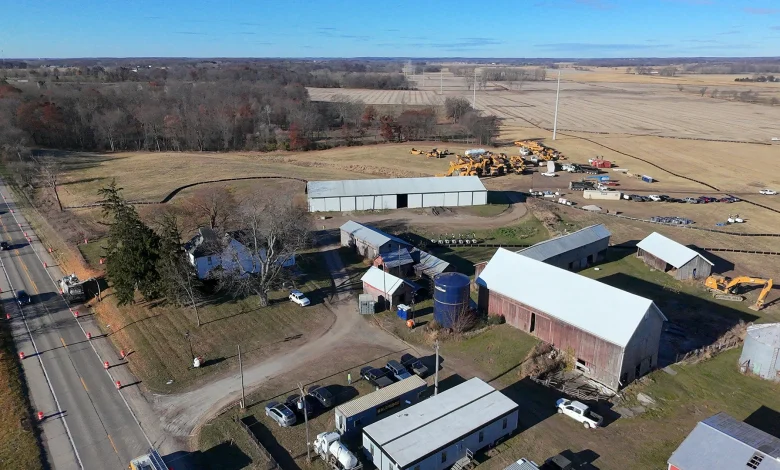Michigan data center review looks like ‘rush job,’ Dana Nessel says

- State energy regulators are reviewing a proposal from DTE Energy to deliver a million homes-worth of power to the state’s first hyperscale data center
- DTE wants fast approval before year’s end, with limited public vetting
- AG Dana Nessel and others are pushing for a deeper review, citing fears that a bad contract could raise energy bills, harm environment
As DTE Energy pushes for swift approval of its plan to deliver power to Michigan’s first hyperscale data center, Attorney General Dana Nessel and other utility watchdogs are criticizing state energy regulators’ handling of the massive contract.
Citing “unprecedented political and industry pressure” to “ram through” approvals for a proposed artificial intelligence data center in Saline Township, Nessel said during a press conference Tuesday that she fears regulators will “rubber stamp” the contract without sufficient vetting.
“This does appear to be a rush job,” Nessel said. “It does appear as though the intention of the Public Service Commission is to rubber stamp whatever DTE wants, because I have no other explanation as to why they would not have a contested hearing.”
The controversy stems from an announcement last month that tech companies Oracle, OpenAI and Related Digital plan to build the $7 billion AI data center on farmland south of Ann Arbor. Now, DTE wants the Michigan Public Service Commission to approve contracts to power the 1.4 gigawatt facility before year’s end, with no formal public vetting.
Officials with the Michigan Public Service Commission have not responded to the request for expedited approval. Last week, they announced a Dec. 3 hearing to gather public comments on the proposal. Members of the public can also submit written comments.
Arguing that’s not enough, multiple groups have petitioned the MPSC to open a so-called contested case, a process overseen by an administrative law judge that typically involves discovery, cross-examinations and formal hearings.
Related:
“This is a precedent-setting decision for the future of data centers and AI development in Michigan,” said state Rep. Morgan Foreman, D-Pittsfield Township. “If we allow one utility to bypass public engagement. We’ve opened the door for it to happen again, and again, and again and again.”
Matt Helms, a spokesperson for the commission, declined to comment on the open case.
A ‘tight timeline’
The proposed contract would be a windfall for DTE, allowing it to profit off a multi-hundred-million-dollar investment in infrastructure needed to meet the energy-hungry data center’s demand for power equivalent to 1 million homes. Project backers also tout the potential for hundreds of jobs and millions in annual tax revenue. Gov. Gretchen Whitmer, a project supporter, has called it “the largest economic project in Michigan history.”
DTE officials contend speed is of the essence or the tech companies will cancel the project.
“Related is on a very tight timeline to construct this project,” DTE Policy and External Affairs Director Dan Mahoney told the Saline City Council earlier this month. “And if we are unable to meet those schedules, it is likely that Oracle will select a different site in a different state.”
But critics fear DTE — which serves 2.2 million customers in southeast Michigan and has repeatedly come under fire for high rates, frequent outages and aggressive political spending intended to ensure political support for its priorities — could use the contract to push rates even higher.
State law requires data centers to pay for system upgrades meant to serve them so residential ratepayers don’t subsidize the industry. DTE officials contend their proposed contract meets that requirement and then some.
But ratepayer advocates argue the company’s heavily redacted filing with the MPSC makes it impossible to vet that claim.
“It’s hard to know what’s missing in the contract when we can’t actually see it,” said Amy Bandyk, executive director of the nonprofit Citizens Utility Board.
The debate over this data center contract is unlikely to be the last. Tech companies have approached no fewer than 10 Michigan communities with data center proposals in various stages of development, prompting concerns about land, water and energy use and complaints about rushed and secretive deals.
Developers often quietly secure land and electricity before publicly announcing their plans. In some cases, they’ve asked local officials to sign non-disclosure agreements. And the tech firms behind the proposals tend to keep their identities secret until negotiations are complete.
Environmental concerns
Data center opponents say that secrecy only heightens their concerns about the facilities’ impacts on ratepayers and the environment.
Hyperscale data centers tend to take up hundreds of acres. Depending how they’re built, they may use vast quantities of water to cool servers. And they use huge amounts of energy, raising questions about whether utilities can deliver without raising costs on other customers or prolonging the use of fossil fuels that are causing climate change.
Studies in other data center-heavy regions have produced mixed results, with load growth caused by data centers causing rate spikes in some cases and helping keep rates down in others. The outcome in Michigan will depend largely on how power contracts are structured.
In some states, the facilities’ massive energy demand has prompted utilities to keep coal plants running past their planned retirement date or plan new gas plants to keep up.
Michigan law requires data centers to procure clean energy covering 90% of their needs and requires utilities to transition fully to clean energy by 2040. DTE officials have said they can meet those requirements, but have declined to elaborate on their plan for doing so.
“What we would like to see is commitments from the data centers to build and pay for renewable energy to power their operations,” said Charlotte Jameson, chief policy officer for the Michigan Environmental Council. “If they want to be good corporate citizens in Michigan, they need to be part of helping us meet our climate goals.”
The MPSC’s next meeting is Dec. 5 at 1 p.m. If commissioners opts not to open a contested case to review the DTE contract, other parties could appeal the decision to the Michigan Court of Appeals.
Related
Thank you to our Michigan Environment Watch sponsors
Environment Watch is made possible by generous financial support from our sponsors. Please visit the About page for more information and to subscribe to Environment Watch. Interested in becoming a sponsor? Contact Emma Carr.
Republish This Story





